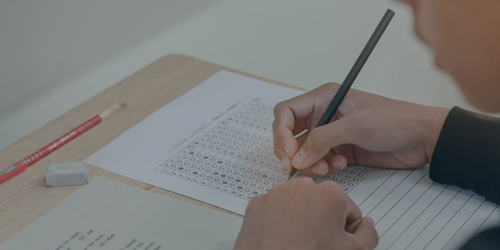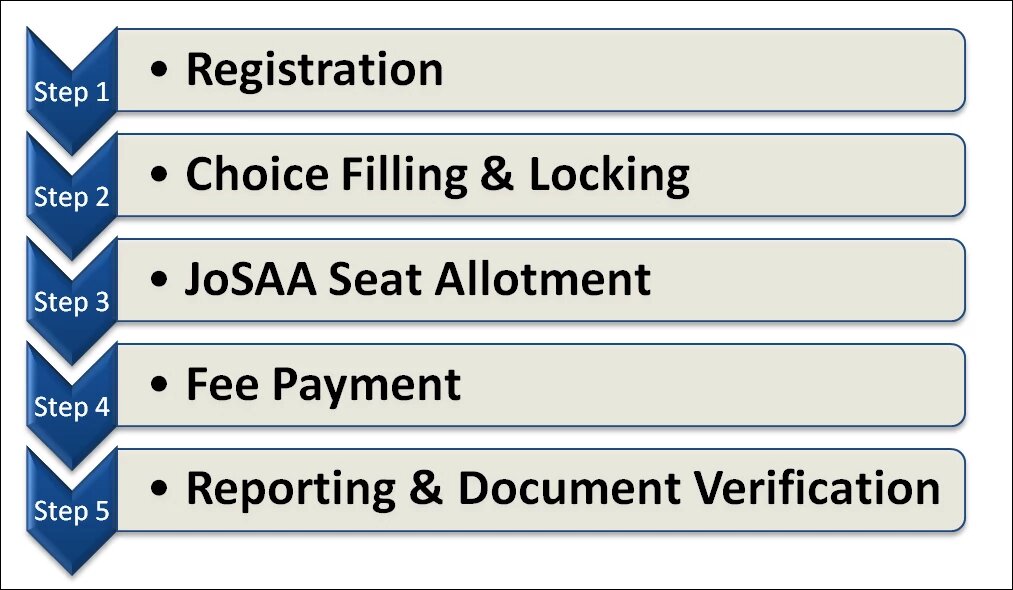JEE MAIN 2022
The registration for JEE MAIN 2022 has been started on 1st March 2022. JEE Main is also an eligibility test for admission to IITs through JEE Advanced. JEE Main Paper 1 is conducted for admission to B.E./B.Tech programs and Paper 2 is held for admission to B.Arch & B.Planning courses separately as JEE Main Paper 2A (B.Arch) and JEE Main Paper 2B (B.Planning). NTA JEE Main 2022 will be conducted twice this year in June and July. Unlike last year with 4 attempts, JEE Main 2022 aspirants will get only 2 chances to score well in the exam.Joint Entrance Examination (JEE Main) is a national-level entrance exam conducted by NTA to offer admissions to BE/BTech, BPlan, and B.Arch courses at the IIITs, NITs, and other top engineering institutions across the country. JEE Main is also the qualifying test for appearing in JEE Advanced which is the entrance exam for admissions to undergraduate programs offered by all the IITs present in India.
Highlights
| Exam Name | Joint Entrance Exam (JEE) Main |
|---|---|
| Conducting Body | National Testing Agency (NTA) |
| Exam Frequency | Two times in a year |
| Exam Duration | 3 hours |
| Papers | B.Arch, B.Plan, and B.E/B.Tech |
| Application Mode | Online |
| Exam Mode | Online & Offline |
JEE Main 2022 Schedule:
NTA has released JEE Main 2022 (Joint Entrance Examination) exam dates for B.Arch/B.Plan and B.E/B.Tech is scheduled in June and July. Here all the important dates of JEE Main 2022 for the June and July session such as registration dates, admit card availability, and exam dates are mentioned.
| Events | Phase 1 | Phase 2 |
|---|---|---|
|
Application form available |
March 1, 2022 | To be notified soon |
|
Last date for application submission |
April 25, 2022 (Upto 11.50 pm) | To be notified soon |
|
Application correction |
April 6 to 8, 2022 | To be notified soon |
|
Availability of admit card |
June 13, 2022 | July 2nd week 2022 |
|
Exam date |
June 20 to 29, 2022 | July 21 to 30, 2022 |
| Result Declared | July 15, 2022 (Tentative) | August 8 to 13, 2022 |
JEE Main 2022 Admit Card:
The JEE Main Admit Card will released by the NTA on its official website, Candidates can download by providing your login credentials. The admit card is the most essential document required inside the examination hall. Without the admit card the candidate won't be allowed to appear the exam. Candidate must provide the hard copy of the admit card to the examiner and must keep it safely afterwards too. The admit card will also be required during the counselling process.
Steps to Download the JEE Main Admit Card
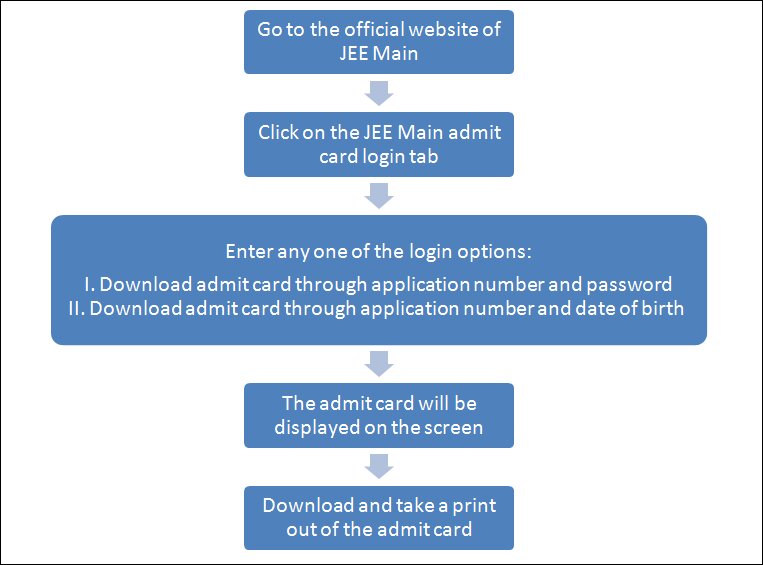
Details Present in the Admit Card
1. Roll number
2. Candidate's name
3. Application number
4. Father's name
5. Course name
6. Date of birth
7. Gender
8. Category
9. State of eligibility
10. Candidate's photograph
11. PwD Status
12. Test city and centre code
13. Date and shift of examination
14. Paper (Paper-I/Paper-II/Paper-III)
15. Photograph of the candidate
16. Candidate and parent signature
17. Important instructions
Things to carry inside the exam hall
1. JEE Main admit card
2. A photo ID proof (Aadhaar card/ voter ID card/ driving license/ PAN card/ passport)
3. Fruits, sugar tablets, and transparent water bottles (for diabetic candidates)
Exam day Instructions Mentioned in the Admit Card:
1. JEE Main aspirant will not be allowed to carry a pen/pencil in the exam hall
2. Pen/ Pencil and blank paper sheets for rough work will be provided in the examination room
3. Candidates must write their name and roll number at the top of the sheet and return the sheets and admit card to the Invigilator, before leaving the examination hall
4. Diabetic students will be allowed to carry eatables like sugar tablets/fruits and transparent water bottle to the examination hall/room. However, they will not be allowed to carry packed foods like chocolates/candy/sandwiches, etc.
5. Candidates will have to sit on the seat allocated to them
6. Candidates will be allowed to appear at the allotted venue of the test only
7. Wearing a watch inside the exam hall is not allowed
8. No candidate will be allowed to enter the exam centre once the exam starts
9. Candidates without an admit card will not be allowed to appear for the exam
10. Leaving exam hall before closure/end of the exam is not permitted
11. Request for change in JEE Main 2022 exam centres will not be entertained
12.Candidates must carry a self water bottle, hand sanitiser, mask, and gloves
13. Candidates must follow the instructions strictly as instructed by the exam authority
14. Every candidate must maintain social distancing at the exam center
In case of Problems Regarding Admit Card
In any case of problem regarding the admit card (may it be a problem in any detail or downloading), candidates can contact the JEE Main Secretariat for necessary action (between 10 AM to 5 PM). The JEE Main helpline numbers are:
7042399520, 7042399521, 7042399525, 7042399526
Forgot the Password?
Follow these steps if you have forgotten your JEE Main password:
1. Go to the official website of JEE Main
2. Click on the “Forgot Password” link
3. Answer the security question
4. A verification code will be sent to the registered mobile number
5. A password reset link will be sent to the registered email ID
6. Click on the reset password link and create a new password
7. Use the new password to download the admit card
JEE Main 2022 Syllabus:
NTA has released the syllabus for both B.E/B. Tech and B.Arch & B.Planning courses, which are:
For B.E/B.Tech:
1. Mathematics
2. Physics
3. Chemistry
For B.Arch/B.Plan:
1. Mathematics
2. Aptitude
3. Drawing (for B.Arch)
4. Planning based questions (for B.Plan)
Mathematics:
| Units | Topic |
|---|---|
| Unit 1: Sets, relations, and functions | - Sets and their representation - Union, intersection, and complement of sets and their algebraic properties - Power set; Relation, Types of relations, equivalence relations, functions; One-one, into and onto functions, the composition of functions |
| Unit 2: Complex numbers and quadratic equations | - Complex numbers as ordered pairs of reals - Representation of complex numbers in the form a+ib and their representation in a plane - algebra of complex numbers - modulus and argument (or amplitude) of a complex number - the square root of a complex number - triangle inequality - Quadratic equations in real and complex number system and their solutions - The relation between roots and coefficients, nature of roots, the formation of quadratic equations with given roots |
| Unit 3: Matrices and determinants | - Matrices - algebra of matrices - types of matrices - determinants and matrices of order two and three - Properties of determinants - Adjoint and evaluation of inverse of a square matrix using determinants and elementary transformations - Test of consistency and solution of simultaneous linear equations in two or three variables using determinants and matrices |
| Unit 4: Permutations and combinations | - The fundamental principle of counting - permutation as an arrangement and combination as selection - Meaning of P (n,r) and C (n,r) - simple applications |
| Unit 5: Mathematical induction | Principle of Mathematical Induction and its simple applications |
| Unit 6: Binomial theorem and its simple applications | - Binomial theorem for a positive integral index - general term and middle term - properties of Binomial coefficients - simple applications |
| Unit 7: Sequences and series | - Arithmetic and Geometric progressions - insertion of arithmetic - geometric means between two given numbers - the relation between A.M. and G.M. sum up to n terms of special series: S n, S n2, Sn3 - Arithmetic – Geometric progression |
| UNIT 8: Limit, continuity, and differentiability | - Real – valued functions - algebra of functions - polynomials - rational - trigonometric - logarithmic and exponential functions - inverse functions - Graphs of simple functions - Limits, continuity, and differentiability - Differentiation of the sum, difference, product, and quotient of two functions - Differentiation of trigonometric - inverse trigonometric - logarithmic - exponential - composite and implicit functions - Rolle’s and Lagrange’s Mean Value Theorems - Applications of derivatives: Rate of change of quantities, monotonic – increasing and decreasing functions - Maxima and minima of functions of one variable - tangents and normals |
| Unit 9: Integral calculus | - Integral as an antiderivative - Fundamental integrals involving algebraic, trigonometric, exponential and logarithmic functions - Integration by substitution, by parts, and by partial fractions. Integration using trigonometric identities - Evaluation of simple integrals of the type Integral as limit of a sum - Fundamental Theorem of Calculus - Properties of definite integrals - Evaluation of definite integrals, determining areas of the regions bounded by simple curves in standard form |
| Unit 10: Differential equations | - Ordinary differential equations, their order, and degree - Formation of differential equations - The solution of differential equations by the method of separation of variables, solution of homogeneous and linear differential equations of the type: dy/dx+p(x)y=q(x) |
| Unit 11: Co-ordinate geometry | - Cartesian system of rectangular co-ordinates 10 in a plane - distance formula - section formula - locus and its equation - translation of axes - the slope of a line - parallel and perpendicular lines - intercepts of a line on the coordinate axes Straight lines: Various forms of equations of a line, intersection of lines, angles between two lines, conditions for concurrence of three lines, distance of a point from a line, equations of internal and external bisectors of angles between two lines, coordinates of centroid, orthocentre and circumcentre of a triangle, equation of family of lines passing through the point of intersection of two lines Circles, conic sections: Standard form of equation of a circle, general form of the equation of a circle, its radius and centre, equation of a circle when the endpoints of a diameter are given, points of intersection of a line and a circle with the centre at the origin and condition for a line to be tangent to a circle, equation of the tangent. Sections of cones, equations of conic sections (parabola, ellipse, and hyperbola) in standard forms, condition for y = mx + c to be a tangent and point (s) of tangency |
| Unit 12: Three-dimensional geometry | - Coordinates of a point in space, the distance between two points, section formula, direction ratios and direction cosines, the angle between two intersecting lines - Skew lines, the shortest distance between them and its equation - Equations of a line and a plane in different forms, the intersection of a line and a plane, coplanar lines |
| Unit 13: Vector algebra | - Vectors and scalars - addition of vectors - components of a vector in two dimensions and three-dimensional space - scalar and vector products, scalar and vector triple product |
| Unit 14: Statistics and probability | Measures of Dispersion: Calculation of mean, median, mode of grouped and ungrouped data calculation of standard deviation, variance and mean deviation for grouped and ungrouped data Probability: Probability of an event, addition and multiplication theorems of probability, Baye’s theorem, probability distribution of a random variate, Bernoulli trials and Binomial distribution |
| Unit 15: Trigonometry | - Trigonometrical identities and equations - Trigonometrical functions - Inverse trigonometrical functions and their properties - Heights and Distances |
| Unit 16: Mathematical reasoning | - Statements, logical operations and, or, implies, implied by, if and only if - Understanding of tautology, contradiction, converse, and contrapositive |
Physics:
The syllabus contains two Section- A and B, Section – A pertains to the Theory Part having 80% weightage, while Sections – B contains a practical component (Experimental Skills) having 20% Weightage.
| Units(Section A) | Topic |
|---|---|
| Unit 1: Physics And Measurement | - Physics, technology and society, S I units, Fundamental and derived units - Least count, accuracy and precision of measuring instruments - Errors in measurement - Dimensions of Physical quantities, dimensional analysis, and its applications |
| Unit 2: Kinematics | - Frame of reference - Motion in a straight line: Position-time graph, speed, and velocity - Uniform and non-uniform motion, average speed and instantaneous velocity - Uniformly accelerated motion, velocity-time, position-time graphs, relations for uniformly accelerated motion - Scalars and Vectors, Vector addition and Subtraction, Zero Vector, Scalar and Vector products, Unit Vector, Resolution of a Vector - Relative Velocity, Motion in a plane, Projectile Motion, Uniform Circular Motion |
| Unit 3: Laws Of Motion |
- Force and Inertia |
| Unit 4: Work, Energy, And Power | - Work done by a constant force and a variable force; kinetic and potential energies, work-energy theorem, power - The potential energy of a spring, conservation of mechanical energy, conservative and non-conservative forces; Elastic and inelastic collisions in one and two dimensions |
| Unit 5: Rotational Motion | - Centre of mass of a two-particle system, Centre of mass of a rigid body; Basic concepts of rotational motion; moment of a force, torque, angular momentum, conservation of angular momentum and its applications; moment of inertia, radius of gyration - Values of moments of inertia for simple geometrical objects, parallel and perpendicular axes theorems and their applications - Rigid body rotation, equations of rotational motion |
| Unit 6: Gravitation | - The universal law of gravitation - Acceleration due to gravity and its variation with altitude and depth - Kepler’s laws of planetary motion - Gravitational potential energy; gravitational potential - Escape velocity - Orbital velocity of a satellite. Geo-stationary satellites |
| Unit 7: Properties Of Solids And Liquids | - Elastic behaviour, Stress-strain relationship, Hooke’s Law, Young’s modulus, bulk modulus, modulus of rigidity - Pressure due to a fluid column; Pascal’s law and its applications - Viscosity, Stokes’ law, terminal velocity, streamline and turbulent flow, Reynolds number. Bernoulli’s principle and its applications - Surface energy and surface tension, angle of contact, application of surface tension – drops, bubbles and capillary rise - Heat, temperature, thermal expansion; specific heat capacity, calorimetry; change of state, latent heat - Heat transfer-conduction, convection and radiation, Newton’s law of cooling |
| Unit 8: Thermodynamics |
- Thermal equilibrium, zeroth law of thermodynamics, the concept of temperature |
| Unit 9: Kinetic Theory Of Gases | - Equation of state of a perfect gas, work done on compressing a gas - Kinetic theory of gases – assumptions, the concept of pressure - Kinetic energy and temperature: RMS speed of gas molecules; Degrees of freedom, Law of equipartition of energy, applications to specific heat capacities of gases; Mean free path, Avogadro’s number |
| Unit 10: Oscillations And Waves | Periodic motion: period, frequency, displacement as a function of time. Periodic functions. Simple harmonic motion (S.H.M.) and its equation; phase; oscillations of a spring -restoring force and force constant; energy in S.H.M. – Kinetic and potential energies; Simple pendulum – derivation of expression for its time period; Free, forced and damped oscillations, resonance Wave motion: Longitudinal and transverse waves, speed of a wave. Displacement relation for a progressive wave. Principle of superposition of waves, the reflection of waves, Standing waves in strings and organ pipes, fundamental mode and harmonics, Beats, Doppler effect in sound |
| Unit 11: Electrostatics | Electric charges: Conservation of charge, Coulomb’s law-forces between two point charges, forces between multiple charges; superposition principle and continuous charge distribution Electric field: Electric field due to a point charge, Electric field lines, Electric dipole, Electric field due to a dipole, Torque on a dipole in a uniform electric field Electric flux, Gauss’s law and its applications to find field due to infinitely long uniformly charged straight wire, uniformly charged infinite plane sheet and uniformly charged thin spherical shell. Electric potential and its calculation for a point charge, electric dipole and system of charges; Equipotential surfaces, Electrical potential energy of a system of two point charges in an electrostatic field Conductors and insulators, Dielectrics and electric polarization, capacitor, the combination of capacitors in series and in parallel, the capacitance of a parallel plate capacitor with and without dielectric medium between the plates, Energy stored in a capacitor |
| Unit 12: Current Electricity | - Electric current, Drift velocity, Ohm’s law, Electrical resistance, Resistances of different materials, V-I characteristics of Ohmic and nonohmic conductors, Electrical energy and power, Electrical resistivity, Colour code for resistors; Series and parallel combinations of resistors; Temperature dependence of resistance - Electric Cell and its Internal resistance, potential difference and emf of a cell, the combination of cells in series and in parallel - Kirchhoff’s laws and their applications - Wheatstone bridge, Metre bridge - Potentiometer – principle and its applications |
| Unit 13: Magnetic Effects Of Current And Magnetism | - Biot – Savart law and its application to current carrying circular loop. Ampere’s law and its applications to infinitely long current carrying straight wire and solenoid. Force on a moving charge in uniform magnetic and electric fields. Cyclotron - Force on a current-carrying conductor in a uniform magnetic field. The force between two parallel current-carrying conductors-definition of ampere. Torque experienced by a current loop in a uniform magnetic field; Moving coil galvanometer, its current sensitivity and conversion to ammeter and voltmeter - Current loop as a magnetic dipole and its magnetic dipole moment. Bar magnet as an equivalent solenoid, magnetic field lines; Earth’s magnetic field and magnetic elements. Para-, dia- and ferromagnetic substances - Magnetic susceptibility and permeability, Hysteresis, Electromagnets and permanent magnets |
| Unit 14: Electromagnetic Induction And Alternating Currents | - Electromagnetic induction; Faraday’s law, induced emf and current; Lenz’s Law, Eddy currents - Self and mutual inductance - Alternating currents, peak and RMS value of alternating current/ voltage; reactance and impedance; LCR series circuit, resonance; Quality factor, power in AC circuits, wattles current - AC generator and transformer |
| Unit 15: Electromagnetic Waves | - Electromagnetic waves and their characteristics. Transverse nature of electromagnetic waves - Electromagnetic spectrum (radio waves, microwaves, infrared, visible, ultraviolet, Xrays, gamma rays) - Applications of e.m. waves |
| Unit 16: Optics | - Reflection and refraction of light at plane and spherical surfaces, mirror formula, Total internal reflection and its applications, Deviation and Dispersion of light by a prism, Lens Formula, Magnification, Power of a Lens, Combination of thin lenses in contact, Microscope and Astronomical Telescope (reflecting and refracting) and their magnifying powers Wave Optics: - wavefront and Huygens’ principle, Laws of reflection and refraction using Huygen’s principle. Interference, Young’s double-slit experiment and expression for fringe width - Diffraction due to a single slit, width of central maximum - Resolving power of microscopes and astronomical telescopes, Polarisation, plane polarized light; Brewster’s law uses of plane-polarized light and Polaroids |
| Unit 17: Dual Nature Of Matter And radiation | - Dual nature of radiation - Photoelectric effect, Hertz and Lenard’s observations; Einstein’s photoelectric equation; particle nature of light - Matter waves-wave nature of particle, de Broglie relation - Davisson-Germer experiment. |
| Unit 18: Atoms And Nuclei | - Alpha-particle scattering experiment; Rutherford’s model of atom; Bohr model, energy levels, hydrogen spectrum - Composition and size of nucleus, atomic masses, isotopes, isobars; isotones - Radioactivity-alpha, beta and gamma particles/rays and their properties; radioactive decay law. Mass-energy relation, mass defect; binding energy per nucleon and its variation with mass number, nuclear fission and fusion |
| Unit 19: Electronic Devices | - Semiconductors; semiconductor diode: I-V characteristics in forward and reverse bias; diode as a rectifier; I-V characteristics of LED, photodiode, solar cell and Zener diode; Zener diode as a voltage regulator - Junction transistor, transistor action, characteristics of a transistor; transistor as an amplifier (common emitter configuration) and oscillator. Logic gates (OR, AND, NOT, NAND and NOR) - Transistor as a switch |
| Unit 20: Communication Systems | - Propagation of electromagnetic waves in the atmosphere; Sky and space wave propagation - Need for modulation - Amplitude and Frequency Modulation - Bandwidth of signals - The bandwidth of the Transmission medium - Basic Elements of a Communication System (Block Diagram only) |
| Unit (Section-B) | Topics |
|
Unit 21: Experimental Skills |
|
Chemistry:
Section A: Physical Chemistry
| Units | Topic |
|---|---|
| Unit 1: Some Basic Concepts In Chemistry | - Matter and its nature, Dalton’s atomic theory - Concept of atom, molecule, element and compound - Physical quantities and their measurements in Chemistry, precision and accuracy, significant figures, S.I. Units, dimensional analysis - Laws of chemical combination - Atomic and molecular masses, mole concept, molar mass, percentage composition, empirical and molecular formulae - Chemical equations and stoichiometry |
| Unit 2: States Of Matter |
Classification of matter into solid, liquid and gaseous states: |
| Unit 3: Atomic Structure | - Thomson and Rutherford atomic models and their limitations - Nature of electromagnetic radiation, photoelectric effect - The spectrum of the hydrogen atom, Bohr model of a hydrogen atom – its postulates, derivation of the relations for the energy of the electron and radii of the different orbits, limitations of Bohr’s model - Dual nature of matter, de Broglie's relationship, Heisenberg uncertainty principle - Elementary ideas of quantum mechanics, the quantum mechanical model of the atom, its important features, the concept of atomic orbitals as one-electron wave functions - various quantum numbers (principal, angular momentum and magnetic quantum numbers) and their significance - shapes of s, p and d – orbitals, electron spin and spin quantum number - Rules for filling electrons in orbitals – Aufbau principle, Pauli’s exclusion principle and Hund’s rule, electronic configuration of elements, extra stability of half-filled and completely filled orbitals |
| Unit 4: Chemical Bonding And Molecular Structure | - Kossel – Lewis approach to chemical bond formation, the concept of ionic and covalent bonds - Ionic Bonding: Formation of ionic bonds, factors affecting the formation of ionic bonds; calculation of lattice enthalpy - Covalent Bonding: Concept of electronegativity, Fajan’s rule, dipole moment - Valence Shell Electron Pair Repulsion (VSEPR) theory and shapes of simple molecules - Quantum mechanical approach to covalent bonding: Valence bond theory – Its important features, the concept of hybridization involving s, p and d orbitals - Molecular Orbital Theory: Its important features, LCAOs, types of molecular orbitals (bonding, antibonding), sigma and pi-bonds, molecular orbital electronic configurations of homonuclear diatomic molecules, the concept of bond order, bond length and bond energy |
| Unit 5: Chemical Thermodynamics |
Fundamentals of thermodynamics: System and surroundings, extensive and intensive properties, state functions, types of processes: - The first law of thermodynamics – Concept of work, heat internal energy and enthalpy, heat capacity, molar heat capacity |
| Unit 6: Solutions | - Different methods for expressing the concentration of solution – molality, molarity, mole fraction, percentage (by volume and mass both), the vapour pressure of solutions and Raoult’s Law – Ideal and non-ideal solutions, vapour pressure – composition, plots for ideal and non-ideal solutions - Colligative properties of dilute solutions – the relative lowering of vapour pressure, depression of freezing point, the elevation of boiling point and osmotic pressure - Determination of molecular mass using colligative properties; Abnormal value of molar mass, van’t Hoff factor and its significance |
| Unit 7: Equilibrium | - Meaning of equilibrium, the concept of dynamic equilibrium - Equilibria involving physical processes: Solid-liquid, liquid – gas and solid-gas equilibria, Henry’s law, general characteristics of equilibrium involving physical processes - Ionic equilibrium: Weak and strong electrolytes, ionization of electrolytes, various concepts of acids and bases (Arrhenius, Bronsted – Lowry and Lewis) and their ionization, acid-base equilibria (including multistage ionization) and ionization constants, ionization of water, pH scale, common ion effect, hydrolysis of salts and pH of their solutions, solubility of sparingly soluble salts and solubility products, buffer solutions |
| Unit 8: Redox Reactions And Electrochemistry | - Electronic concepts of oxidation and reduction, redox reactions, oxidation number, rules for assigning oxidation number, balancing of redox reactions - Electrolytic and metallic conduction, conductance in electrolytic solutions, specific and molar conductivities and their variation with concentration: Kohlrausch’s law and its applications - Electrochemical cells – Electrolytic and Galvanic cells, different types of electrodes, electrode potentials including standard electrode potential, half – cell and cell reactions, emf of a Galvanic cell and its measurement - Nernst equation and its applications; Relationship between cell potential and Gibbs’ energy change - Dry cell and lead accumulator; Fuel cells |
| Unit 9: Chemical Kinetics | - Rate of a chemical reaction, factors affecting the rate of reactions: concentration, temperature, pressure and catalyst - elementary and complex reactions, order and molecularity of reactions, rate law, rate constant and its units, differential and integral forms of zero and first-order reactions, their characteristics and half-lives, effect of temperature on rate of reactions – Arrhenius theory, activation energy and its calculation, collision theory of bimolecular gaseous reactions (no derivation) |
| Unit 10: Surface Chemistry | - Colloidal state- distinction among true solutions, colloids and suspensions, classification of colloids – lyophilic, lyophobic - multi molecular, macromolecular and associated colloids (micelles), preparation and properties of colloids – Tyndall effect, Brownian movement, electrophoresis, dialysis, coagulation and flocculation - Emulsions and their characteristics |
Section B: Inorganic Chemistry
| Unit 11: Classification Of Elements And Periodicity In Properties | Modem periodic law and present form of the periodic table, s, p, d and f block elements, periodic trends in properties of elements atomic and ionic radii, ionization enthalpy, electron gain enthalpy, valence, oxidation states and chemical reactivity |
| Unit 12: General Principles And Processes Of Isolation Of Metals | Modes of occurrence of elements in nature, minerals, ores; Steps involved in the extraction of metals – concentration, reduction (chemical and electrolytic methods) and refining with special reference to the extraction of Al, Cu, Zn and Fe; Thermodynamic and electrochemical principles involved in the extraction of metals |
| Unit 13: Hydrogen | - Position of hydrogen in periodic table, isotopes, preparation, properties and uses of hydrogen - Physical and chemical properties of water and heavy water - Structure, preparation, reactions and uses of hydrogen peroxide - Hydrogen as a fuel |
| Unit 14: S – Block Elements (Alkali And Alkaline Earth Metals) | - Group – 1 and 2 Elements: General introduction, electronic configuration and general trends in physical and chemical properties of elements, anomalous properties of the first element of each group, diagonal relationships - Preparation and properties of some important compounds – sodium carbonate and sodium hydroxide; Industrial uses of lime, limestone, Plaster of Paris and cement; Biological significance of Na, K, Mg and Ca |
| Unit 15: P – Block Elements |
- Group – 13 to Group 18 Elements |
| UNIT 16: D – And F – Block Elements | - Transition Elements: General introduction, electronic configuration, occurrence and characteristics, general trends in properties of the first-row transition elements – physical properties, ionization enthalpy, oxidation states, atomic radii, colour, catalytic behaviour, magnetic properties, complex formation, interstitial compounds, alloy formation; Preparation, properties and uses of K2 Cr2 O7 and KMnO4 - Inner Transition Elements: Lanthanoids – Electronic configuration, oxidation states and lanthanoid contraction - Actinoids – Electronic configuration and oxidation states |
| Unit 17: Co-Ordination Compounds | - Introduction to coordination compounds, Werner’s theory - ligands, coordination number, denticity, chelation; IUPAC nomenclature of mononuclear coordination compounds, isomerism - Bonding-Valence bond approach and basic ideas of Crystal field theory, colour and magnetic properties; Importance of coordination compounds (in qualitative analysis, extraction of metals and in biological systems) |
| Unit 18: Environmental Chemistry | - Environmental pollution – Atmospheric, water and soil - Atmospheric pollution – Tropospheric and Stratospheric - Tropospheric pollutants – Gaseous pollutants: Oxides of carbon, nitrogen and sulphur, hydrocarbons; their sources, harmful effects and prevention; Greenhouse effect and Global warming; Acid rain - Particulate pollutants: Smoke, dust, smog, fumes, mist; their sources, harmful effects and prevention - Stratospheric pollution- Formation and breakdown of ozone, depletion of the ozone layer – its mechanism and effects - Water Pollution – Major pollutants such as pathogens, organic wastes and chemical pollutants; their harmful effects and prevention - Soil pollution – Major pollutants such as Pesticides (insecticides,. herbicides and fungicides), their harmful effects and prevention. Strategies to control environmental pollution |
Section C: Organic Chemistry
| Unit 19: Purification And Characterisation Of Organic Compounds | - Purification – Crystallization, sublimation, distillation, differential extraction and chromatography – principles and their applications - Qualitative analysis – Detection of nitrogen, sulphur, phosphorus and halogens - Quantitative analysis (basic principles only) – Estimation of carbon, hydrogen, nitrogen, halogens, sulphur, phosphorus - Calculations of empirical formulae and molecular formulae; Numerical problems in organic quantitative analysis |
| Unit 20: Some Basic Principles Of Organic Chemistry | - Tetravalency of carbon; Shapes of simple molecules – hybridization (s and p); Classification of organic compounds based on functional groups: – C = C –, – C h C – and those containing halogens, oxygen, nitrogen and sulphur; Homologous series; Isomerism – structural and stereoisomerism - Nomenclature (Trivial and IUPAC), - Covalent bond fission – Homolytic and heterolytic: free radicals, carbocations and carbanions; stability of carbocations and free radicals, electrophiles and nucleophiles - Electronic displacement in a covalent bond – Inductive effect, electromeric effect, resonance and hyperconjugation |
| Unit 21: Hydrocarbons | - Classification, isomerism, IUPAC nomenclature, general methods of preparation, properties and reactions - Alkanes – Conformations: Sawhorse and Newman projections (of ethane); Mechanism of halogenation of alkanes - Alkenes – Geometrical isomerism; Mechanism of electrophilic addition: addition of hydrogen, halogens, water, hydrogen halides (Markownikoff’s and peroxide effect); Ozonolysis and polymerization - Alkynes – Acidic character; Addition of hydrogen, halogens, water and hydrogen halides; Polymerization - Aromatic hydrocarbons – Nomenclature, benzene – structure and aromaticity; Mechanism of electrophilic substitution: halogenation, nitration, Friedel – Craft’s alkylation and acylation, directive influence of the functional group in mono-substituted benzene |
| Unit 22: Organic Compounds Containing Halogens | - General methods of preparation, properties and reactions; Nature of C-X bond; Mechanisms of substitution reactions - Uses; Environmental effects of chloroform & iodoform |
| Unit 23: Organic Compounds Containing Oxygen | General methods of preparation, properties, reactions and uses |
| Alcohols, Phenols And Ethers | - Alcohols: Identification of primary, secondary and tertiary alcohols; mechanism of dehydration - Phenols: Acidic nature, electrophilic substitution reactions: halogenation, nitration and sulphonation, Reimer – Tiemann reaction - Ethers: Structure - Aldehyde and Ketones: Nature of carbonyl group - Nucleophilic addition to >C=O group, relative reactivities of aldehydes and ketones - Important reactions such as – Nucleophilic addition reactions (addition of HCN, NH3 and its derivatives), Grignard reagent; oxidation; reduction (Wolff Kishner and Clemmensen); the acidity of r – hydrogen, aldol condensation, Cannizzaro reaction, Haloform reaction; Chemical tests to distinguish between aldehydes and Ketones |
| Carboxylic Acids | Acidic strength and factors affecting it |
| Unit 24: Organic Compounds Containing Nitrogen | - General methods of preparation, properties, reactions and uses - Amines: Nomenclature, classification, structure, basic character and identification of primary, secondary and tertiary amines and their basic character - Diazonium Salts: Importance in synthetic organic chemistry |
| Unit 25: Polymers | - General introduction and classification of polymers, general methods of polymerization-addition and condensation, copolymerization - Natural and synthetic rubber and vulcanization - some important polymers with emphasis on their monomers and uses – polythene, nylon, polyester and bakelite |
| UNIT 26: Biomolecules | - General introduction and importance of biomolecules - Carbohydrates – Classification: aldoses and ketoses; monosaccharides (glucose and fructose) and constituent monosaccharides of oligosaccharides (sucrose, lactose and maltose) - Proteins – Elementary Idea of r – amino acids, peptide bond, polypeptides; Proteins: primary, secondary, tertiary and quaternary structure (qualitative idea only), denaturation of proteins, enzymes - Vitamins – Classification and functions - Nucleic Acids – Chemical constitution of DNA and RNA. Biological functions of nucleic acids |
| UNIT 27: Chemistry in Everyday Life | - Chemicals in medicines – Analgesics, tranquillizers, antiseptics, disinfectants, antimicrobials, antifertility drugs, antibiotics, antacids, antihistamines – their meaning and common examples - Chemicals in food – Preservatives, artificial sweetening agents – common examples. Cleansing agents – Soaps and detergents, cleansing action |
| UNIT 28: PRINCIPLES RELATED TO PRACTICAL CHEMISTRY | - Detection of extra elements (N, S, halogens) in organic compounds; Detection of the following functional groups: hydroxyl (alcoholic and phenolic), carbonyl (aldehyde and ketone), carboxyl and amino groups in organic compounds - The chemistry involved in the preparation of the following: Inorganic compounds: Mohr’s salt, potash alum - Organic compounds: Acetanilide, pnitroacetanilide, aniline yellow, iodoform - The chemistry involved in the titrimetric exercises – Acids bases and the use of indicators, oxalic-acid vs KMnO4, Mohr’s salt vs KMnO4 - Chemical principles involved in the qualitative salt analysis: Cations – Pb2+, Cu2+, AI3+, Fe3+, Zn2+, Ni2+, Ca2+, Ba2+, Mg2+, NH4+. Anions- CO3 2-, S2-, SO4 2-, NO2-, NO3-, CI -, Br, I. (Insoluble salts excluded) |
| Chemical principles involved in the following experiments | - Enthalpy of solution of CuSO4 - Enthalpy of neutralization of strong acid and strong base - Preparation of lyophilic and lyophobic sols - Kinetic study of the reaction of iodide ion with hydrogen peroxide at room temperature |
For B.Arch/B-Planning:
| Section | Topics |
|---|---|
|
Part I (Aptitude) |
- Awareness of persons, places, Buildings, Materials. Objects, Texture related to Architecture and build—environment - Visualising three-dimensional objects from two-dimensional drawings - Visualising. different sides of three-dimensional objects - Analytical Reasoning Mental Ability (Visual, Numerical and Verbal) |
| Part II (Drawing) | - Three dimensional - perception: Understanding and appreciation of scale and proportion of objects, building forms and elements, colour texture, harmony and contrast - Design and drawing of geometrical or abstract shapes and patterns in pencil - Transformation of forms both 2 D and 3 D union, subtraction, rotation, development of surfaces and volumes, Generation of Plan, elevations and 3 D views of objects - Creating two dimensional and three-dimensional compositions using given shapes and forms - Sketching of scenes and activities from memory of urbanscape (public space, market, festivals, street scenes, monuments, recreational spaces, ect.), landscape (river fronts, jungles, trees, plants, etc.) and rural life |
| Part III (Planning) |
-General awareness- knowledge about prominent cities, development issues, government programmes -Social sciences- The idea of nationalism, Power-sharing, Economic development -Thinking Skills- Comprehension, critical reasoning, graphs and tables |
JEE Main 2022 Exam Pattern:
For B.E/B.Tech (Online mode exam):
| Subject | Number of Questions | Marks |
|---|---|---|
| Physics | 30 (20+10*) | 100 |
| Chemistry | 30 (20+10*) | 100 |
| Mathematics | 30 (20+10*) | 100 |
| Total | 90 | 300 |
* 20 MCQ questions and 10 special questions (to be filled with numerical value)
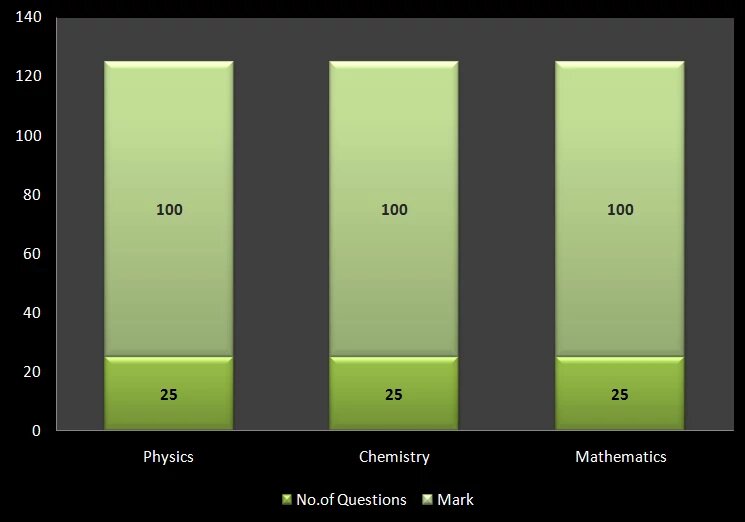
Marking Scheme:
MCQ questions: +4 marks for each correct answer and -1 mark for each incorrect answer
Non-MCQ questions: +4 marks for each correct answer and 0 marks for each incorrect answer
Method of Resolving Ties:
Tie between the candidates having equal scores will be resolved in the following descending order:
- NTA score in Mathematics
- NTA score in Physics
- NTA score in Chemistry
- Candidates having a lesser number of negative responses in the paper
- Candidates older in Age
- Application number in ascending order
For B.Arch (Part I & II online modes and Part III offline mode exam):
| Subject | Number of Questions | Marks |
|---|---|---|
| Mathematics-Part I | 30 (20+10*) | 100 |
| Aptitude Test-Part II | 50 | 200 |
| Drawing Test –Part III | 2 | 100 |
| Total | 82 | 400 |
* 20 MCQ questions and 10 special questions (to be filled with numerical value)
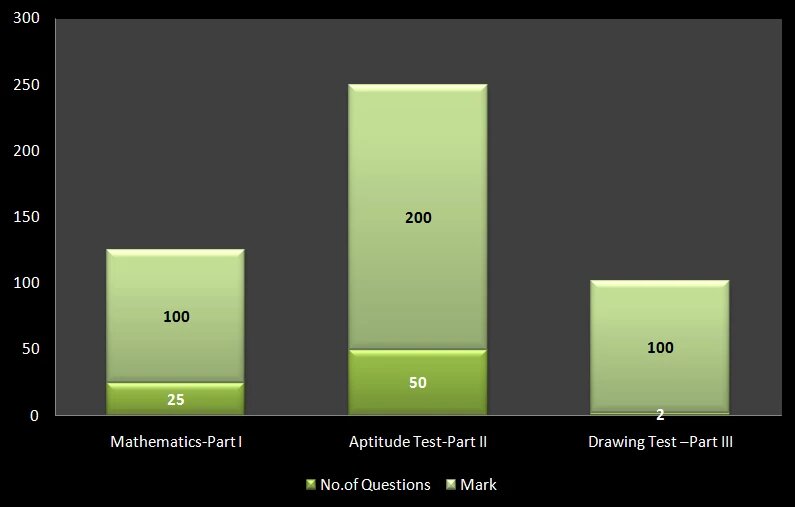
Marking Scheme:
MCQ questions: +4 marks for each correct answer and -1 mark for each incorrect answer
Non-MCQ questions: +4 marks for each correct answer and 0 marks for each incorrect answer
Drawing Test: Two questions to be evaluated out of 100 marks
Method of Resolving Ties:
Tie between the candidates having equal scores will be resolved in the following descending order:
- NTA score in Mathematics
- NTA score in Aptitude Test
- NTA score in Drawing Test
- Candidates having a lesser number of negative responses in the paper
- Candidates older in age
- Application number in ascending order
For B.Planning (Online mode exam):
| Subject | Number of Questions | Marks |
|---|---|---|
| Mathematics-Part I | 30 (20+10*) | 100 |
| Aptitude Test-Part II | 50 | 200 |
| Planning Based MCQs | 25 | 100 |
| Total | 105 | 400 |
* 20 MCQ questions and 5 special questions (to be filled with numerical value)
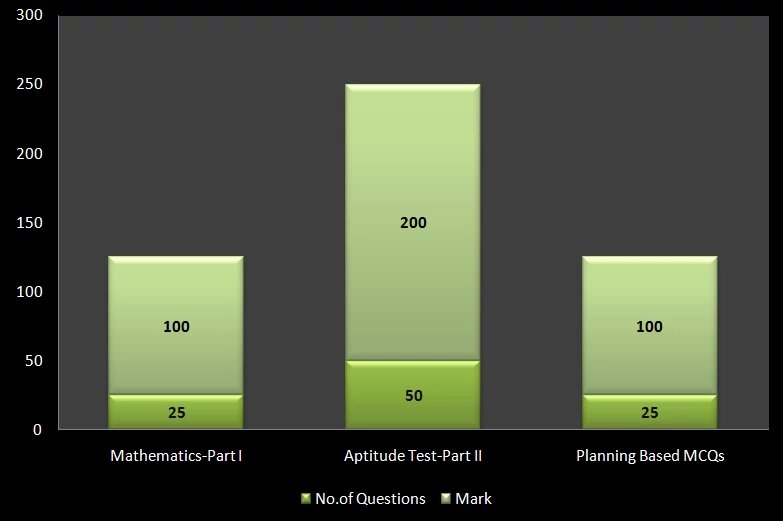
Marking Scheme:
MCQ questions: +4 marks for each correct answer and -1 mark for each incorrect answer
Non-MCQ questions: +4 marks for each correct answer and 0 marks for each incorrect answer
Method of Resolving Ties:
Tie between the candidates having equal scores will be resolved in the following descending order:
- NTA score in Mathematics
- NTA score in Aptitude Test
- NTA score in Planning Based Questions
- Candidates having a lesser number of negative responses in the paper
- Candidate older in age
- Application number in ascending order
JEE Main 2021 Cut Off:
JEE Main 2021 Category Wise Cut-Off (For JEE Advanced):
| Category | Cut-Off |
|---|---|
| Common Rank List (CRL) | 90-95 |
| Economically Weaker Section (EWS) | 70-75 |
| Other Backward Class (OBC-NCL) | 70-75 |
| Scheduled Caste (SC) | 50-55 |
| Scheduled Tribe (ST) | 40-45 |
| People with Disability(PwD) | 1-2 |
Factors affecting cut-off:
- Number of aspirants appearing for JEE Main
- The difficulty level of the exam
- Total number of seats available
- Total number of qualified candidates
- Previous year cut-off
JEE Main previous year Qualifying Cut-Off:
| Category | Cut-Off |
|---|---|
| Common Rank List (CRL) | 90.3765335 |
| Economically Weaker Section (EWS) | 70.2435518 |
| Other Backward Class (OBC-NCL) | 72.8887969 |
| Scheduled Caste (SC) | 50.1760245 |
| Scheduled Tribe (ST) | 39.0696101 |
| People with Disability (PwD) | 0.0618524 |
5 things to do if you couldn't clear your JEE Mains
JEE Main 2022 Application form
Steps to Apply:
1. Registration:
1. Go to the official website of JEE Main
2. Click on "Registration"
3. Fill in all the required details and submit
4. Your application number and password will be generated
2. Completion of Application Form:
1. Login using the application number and password generated
2. Choose your choice of paper (B.E/B. Tech or B.Arch or B.Planning)
3. Provide your personal details
4. Provide academic details
5. Choose your city preferences
3. Uploading Documents:
1. Photo: JPG/JPEG format of size 10KB to 200KB
2. Signature: JPG/JPEG format of size 4KB to 30KB
4. Payment
Payment can be made through debit/credit card/net banking account/UPI/PAYTM Service. After successful payment, the confirmation page is printed. If the confirmation page is not generated, then the transaction is canceled and the candidate has to approach the bank for the refund. The candidate can then have to make another payment to successfully apply.
Necessary Documents during applying:
1. Valid E-mail Id & Mobile Number
2. Valid debit/credit card/net banking account/UPI/PAYTM Service
3. Class 10th certificate
4. Domicile Certificate
5. Caste Certificate for SC/ST
6. Scanned clear passport photograph in JPG/JPEG format (size between 10 kb-200 kb)
7. Class 12th mark sheet
8. Scanned clear signature in JPG/JPEG format (size between 4 kb-30 kb)
9. A computer with good internet connectivity
10. A printer connected to the system to print the confirmation page
11. Foreign candidates who are interested to apply also need to submit all the above documents including the citizenship certificate/Passport of both parents.
JEE Main 2022 Application Fee:
The application fee of JEE Main is non-refundable and is accepted through an online mode of payment or through e-challan.
| Exam | Category | Application fee in India | Application fee outside India |
|---|---|---|---|
| Paper 1 or Paper 2 (B.E./B.Tech.) | General/ OBC (Non-creamy layer) |
Boys- 650 Girls- 325 |
Boys- 3000 Girls- 1500 |
| Paper 1 or Paper 2 (B.E./B.Tech.) | SC/ST/PwD/ Transgender |
Boys- 325 Girls- 325 |
Boys- 1500 Girls- 1500 |
| Both Paper 1 & Paper 2 | Gen/OBC-NCL |
Boys-1300 Girls- 650 |
Boys- 6000 Girls- 3000 |
| Both Paper 1 & Paper 2 | SC/ST/PwD & Transgender |
Boys- 650 Girls- 650 |
Boys- 3000 Girls- 3000 |
Changes to JEE Main:
1. JEE Main will be conducted by National Testing Agency (NTA) two times a year- June and July.
2. The number of questions in Physics, Chemistry, and Mathematics will be increased from 25 to 30. There will be no negative marking in Section B.
3. Application fees of candidates for different categories for JEE Main 2021 have been reduced.
4. Paper-I will be completed in two shifts and Paper-II will be of one shift.
5. JEE Main will be conducted in computer-based (Online) mode whereas the drawing section of Paper 2 will be conducted with pen and paper-based.
6. The exam will be conducted in 13 regional languages.
8. Mock tests and Sample Papers are available online which can be downloaded and practiced at home or at practice centers.
9. Candidates have the option to pay a fee for two sessions at a time. If they does not want to appear for the exam after fee payment, he/ she can seek a refund of fees and withdraw the application form.
10. Interested candidates can apply for multiple sessions at a time or can also apply after the conclusion of each cycle of the exam. The application portal will be re-opened after each session.
11. The number of test cities is increased to 331 and that of abroad has been reduced to 9 (Dhaka is no longer an option).
12. The candidates which are applying for JEE Main 2021 Paper-II must have scored 50% individually in Physics, Chemistry, and Mathematics and also 50% aggregate marks in the 10+2th standard or equivalent examination.
The registration process for EWS Reservation:
There is the relevancy of the 10% Economically Weaker Section reservation for candidates applying for JEE MAIN 2021 so the candidates belonging to this category have to mention it in the application form and here is the applying process-
1. Visit the official website i.e jee main.nic.in.
2. Click on the application form link given there.
3. During the form fill up, mark yourself as EWS category
4. Save the form by putting accurate details.
Know about: JEE Main Exam Centres: State-wise List
JEE Main 2022 Counselling:
The counseling session for JEE Main occurs soon after the announcement of the result. The counseling session is a vital portion of the selection procedure. A candidate must attain the Joint Seat Allocation Authority (JoSAA). JoSAA is established by the MHRD (Ministry of Human Resource Development) that oversees joint seat allocations for 23 IITs, 31 NITs, 25 IIITs, and 28 Other-GFTIs (Government Funded Technical Institutes). A total of 7 rounds are conducted for seat allocation by JoSAA.
To register for JoSAA, Click Here
Steps Involved in JEE Main Counseling Process
Step 1. Registration:
1. Go to the official website of JEE Main and then click on JoSAA link
2. Login using JEE Main application number and password
3. Provide all the details in the counseling form
4. Select the declaration and then click on "submit"
5. Then click on "Confirm Registration"
Step 2. Choice Filling & Locking:
1. Select the choice of colleges and programs
2. Lock your choices before the last date
3. Choice locking can be done after each round of JEE Main 2020 Counselling
Step 3. JoSAA Seat Allotment:
For counseling and seat allotment JoSAA takes into account the following factors before allocating the highest possible seat according to candidates’ choices:
1. Candidates category (General, OBC, SC, ST, etc.)
2. JEE Main All India Rank (AIR)
3. Priority order of choices by the candidate
4. Availability of seats
Step 4. Fee Payment:
Candidates can pay the seat acceptance fee through Net-Banking/E-Challan which is:
1. For Non-Reserved candidates: Rs. 35,000/-
2. For SC/ST/SC-PwD/ST-PwD/GEN-PwD/OBC-NCL-PwD candidates: Rs. 15,000/-
Step 5. Reporting & Document Verification:
The final step of the counseling process is to report to the assigned institutes with original certificates and documents on the allotted date and time slot. The documents that the candidate should carry are:
1. Photo ID proof
2. Date of Birth proof
3. Three passport-size photographs
4. JEE Main admit card
5. JEE Main scorecard
6. Proof of Seat Acceptance Fee Payment
7. 10th & 12th mark sheets
8. Provisional Seat Allotment Letter
9. Category certificate (if applied)
Participating Institutes:
A total of 93 institutes participate in the seat allocation procedure through JoSAA
| Name of Institute | Total Colleges | Total Seats |
|---|---|---|
| Indian Institute of Technology (IIT) | 23 | 10,988 |
| National Institute of Technology (NIT) | 31 | 23,506 |
| Indian Institute of Information Technology (IIIT) | 23 | 5,643 |
| Government Funded Technical Institutes | 20 | 5,620 |
Top 10 NIT Colleges participating:
| Sr. No. | Institute | Location | Total Seats |
|---|---|---|---|
| 1 | NIT Trichy | Tamil Nadu | 814 |
| 2 | NIT Rourkela | Odisha | 850 |
| 3 | NIT Surathkal | Karnataka | 740 |
| 4 | NIT Warangal | Telangana | 800 |
| 5 | Motilal Nehru NIT | Uttar Pradesh | 814 |
| 6 | Visvesvaraya NIT | Maharashtra | 746 |
| 7 | NIT Calicut | Kerala | 937 |
| 8 | Sardar Vallabhbhai NIT | Gujarat | 873 |
| 9 | NIT Silchar | Assam | 632 |
| 10 | NIT Durgapur | West Bengal | 672 |
JEE Main 2022 Result:
National Testing Agency (NTA) will announce the result of JEE Main 2022 (Joint Entrance Examination) for 2 sessions. Candidates have to provide their Application Number and Date of Birth to check their results. Candidates who will clear the cut-off will be called for the Counselling Process.
Steps to Check the Result:
1. Go to the official website of JEE Main
2. Click on the link of JEE Main 2022 result
3. Enter your JEE Main Application Number and password/ date of birth
4. The scorecard will appear on the screen
5. Download and take a print out of the scorecard
Details mentioned on the scorecard:
1. Name of the Candidate
2. Roll number
3. Date of Birth
4. Name of parents
5. Nationality and Category of the candidate
6. Sectional marks obtained
7. Total marks obtained
8. All India Rank and Category Rank
9. JEE Advanced Qualifying Status
JEE Main Mark Vs Percentile
How to Calculate JEE Result/Rank?
JEE Main result is determined through the process of normalization. As JEE Main is conducted in a few shifts and on different days, it is possible for students to get easy questions on some dates and tough questions on another. For this purpose, the normalization process is used to determine percentile and rank.
Percentile Score:
The percentile score is based on the performance of all the candidates appearing in the exam. As per the official website of JEE Main, "The Percentile Score indicates the percentage of candidates that have scored equal to or below (same or lower raw scores) that particular Percentile in that examination. Therefore the topper (highest score) of each session gets the same Percentile of 100 which is desirable. The marks obtained in between the highest and lowest scores are also converted to appropriate Percentiles."
Difference Between Percentage and Percentile:
1. A percentage is a number out of 100
2. A percentile score of a candidate will reflect how many candidates have scored below that candidate in an exam. A Percentile score is a value below which a certain percent of observations fall.
Normalization Process:
Normalization is the process of identifying a candidate's actual merit/rank by creating the same level playing field for every student.
Formula to calculate JEE Main score:

Calculation of JEE Main Percentile:
The JEE Main overall percentile for each candidate is calculated on the basis of the percentile of each subject (Physics, Chemistry, and Mathematics).
The formula is:
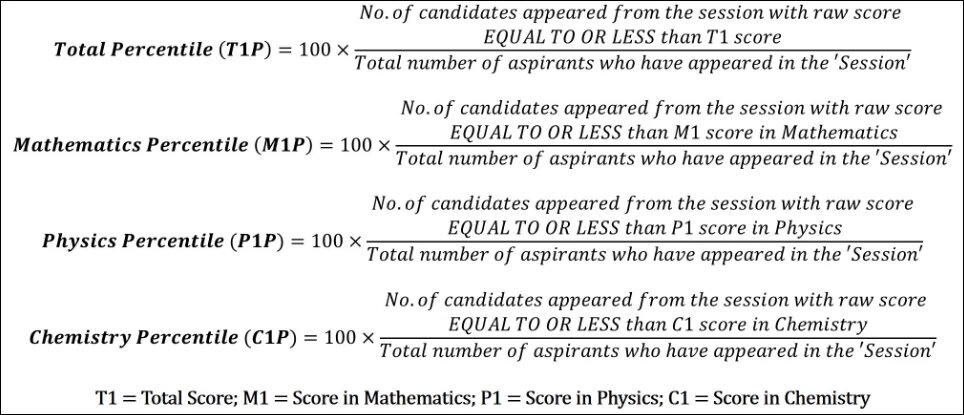
JEE Main Tie Breaking Solution:
In the case of two or more candidates securing the same percentile in JEE Main, the ranking will be determined in the priority of the following steps:
For B.Tech:
1. Candidate securing more percentile score in mathematics will be ranked higher
2. Candidate securing more percentile score in physics will be ranked higher
3. Candidate securing more percentile score in chemistry will be ranked higher
4. Candidate older in age will be ranked higher
5. Application number in ascending order
For B.Arch:
1. Candidate securing more score in mathematics will be ranked higher
2. Candidate securing more score in the aptitude test will be ranked higher
3. Candidate securing more score in the drawing test will be ranked higher
4. Candidates having a lesser number of negative responses in the paper will be ranked higher
5. Candidate older in age will be ranked higher
6. Application number in ascending order
For B.Plan:
1. Candidate securing more score in mathematics will be ranked higher
2. Candidate securing more score in the aptitude test will be ranked higher
3. Candidate securing more score in planning based questions will be ranked higher
4. Candidate older in age will be ranked higher
5. Application number in ascending order
JEE Main 2022 Answer Key:
NTA has released the final answer key of JEE Main 2022 (Joint Entrance Examination) Paper 1 -B.E/B.Tech. The answer key is available for everyone as it requires no login credentials to access it. The answer key is available for everyone to see as no login credentials are needed to access it. The exam will be conducted in 501 Cities including 25 cities outside of India.
Steps to Check the Answer Key:
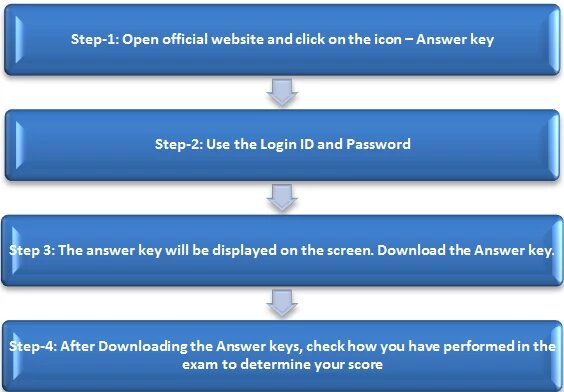
Steps to Challenge the Answer Key:
1. Login:
1. Go to the official website of JEE Main
2. Click on the ‘Challenge(s) regarding Answer Key’ link
3. log in to the website by entering the application number and password
2. Choosing the Option:
1. The question id and respective correct option id will appear on the screen in section-wise for paper 1 & 2
2. Candidates willing to challenge the answer key can select any one or more than one of the Option ID(s) by clicking the checkbox
3. Click on the ‘Save your Claim Finally’ button
4. The option ID(s) challenged by the candidates will appear on the screen
3. Uploading Documents:
They have to upload the necessary supporting documents in the form of PDF by clicking on the ‘Choose File’ button on the screen.
4. Payment:
Pay the fee of Rs. 200/- (for each challenge) through Debit/Credit Card/Net Banking.
JEE Main 2022 Eligibility:
Candidates must check the eligibility criteria carefully before filling out an application for the JEE Main 2022: The following are the eligibility criteria from below:
Age Limit
For JEE Main 2022 there is no age limit for candidates. The candidates who have passed the class 12 / equivalent examination in 2020, 2021 or appearing in 2022 irrespective of their age can appear in the examination.
Attempt Limit
1. Candidates can appear a maximum of three times for the JEE Mains exam.
2. Attempted limits are the same for all the categories.
3. Candidates can appear for a maximum of two consecutive years for JEE advanced.
Educational Qualification:
For B.Planning: The candidates must have passed qualifying exams with 50% marks in Mathematics and 50% marks in aggregate of the qualifying exams.
For B.E/B. Tech: The applicants must have passed qualifying exams with Physics and Mathematics as compulsory subjects along with one of the Chemistry/Biotechnology/Biology/Technical Vocation subjects.
For B.Arch: The candidates must have passed the qualifying examination with Mathematics, Physics, Chemistry.
Qualifying Exams to Appear for JEE Main:
The basic qualifying exam to appear JEE Main is 12th from a recognized board and institution. However, there are other equivalent qualifying exams considered for eligibility in the JEE Main Exams, such as:
1. Final examination of the two-year course of the Joint Services Wing of the National Defense Academy (NDA)
2. Senior Secondary School Examination conducted by the National Institute of Open Schooling with a minimum of five subjects
3. Any Public School/ Board/ University examination in India or in any foreign country recognized as equivalent to the 10+2 system by the Association of Indian Universities (AIU)
4. Higher Secondary Certificate Vocational Examination
5. A Diploma degree holder recognized by AICTE or a State board of technical education of at least a 3-year duration
6. General Certificate of Education (GCE) examination (London/Cambridge/Sri Lanka) at the Advanced (A) level
Eligibility Criteria for Droppers:
Candidates who have gap years after 12th have to meet certain criteria, such as:
For admissions into NITs, IIITs and CFTIs admissions, applicants must have obtained a 75% aggregate or be amongst the top 20 percentile of their respective boards. At least 65% of marks are required for SC/ST category candidates
Reservation Criteria:
1. 15% of the seats Scheduled Castes (SC) candidates
2. 7.5% seats for Scheduled Tribes (ST) candidates
3. 27% seats for Other Backward Classes (OBC)
4. 10% of the seats for General Economically Weaker Sections (General - EWS) candidates
5. 405 of the seats for Persons with Disability (PwD) candidates
Reservation of Seats in Different Institutes:
| Institute | Reservation Criteria |
|---|---|
| NIT (Other State Quota) | 50% seats reserved for candidates belonging to all other states and Union Territories excluding Home State |
| NIT (Home Quota) | 50% of seats are reserved |
| Centre Funded Technical Institutes | Based on Home Quota/ State Quota/ All India Quota |
| State-Funded Technical Institutes | Based on Home Quota/ State Quota/ All India Quota |
| Indian Institute of Information Technology (IIIT) | Based on Home Quota/ State Quota/ All India Quota |
| Government Funded Technical Institutes | Based on All India Quota |
| State Engineering Colleges | Based on State Quota |
JEE Main 2022 FAQs:
Q: What is the minimum mark required to get admission at NITs?
A: The minimum score required to secure a position at the NITs is 94 or 95 percent.
Q: What is the mode of the exam?
A: The entrance exam of JEE Main is conducted by online mode only.
Q: Are there any changes in the syllabus for JEE Main 2022?
A: No. There is no change in the syllabus of JEE Main 2022.
Q: What is the pass mark for JEE MAIN 2022?
A: The candidate should have passed 12th in science with a minimum of 50% marks with subject Physics, Mathematics & Chemistry, etc.
Q: Is there any facility to edit the application form of JEE MAIN?
A: Yes you can bring changes to your application form during the form correction process.
Q: If there is any issue created during the application fee, what can be done?
A: If you face situations like transaction fail or something then you need to pay the fees again and if your balance is deducted due to any technical failure then
Q: How many times JEE MAIN is conducted this year?
A: JEE MAIN is going to be conducted 2 times this year (i.e., June and July).
Q: I am thinking of attempting both the session. But what if I secured fewer marks on the second attempt?
A: Don't worry, If you want to attempt both the session then go for it because the higher score of the two exams will be considered for admissions.
Q: Is there any changes related to exam centers this year?
A: Yes, the number of test cities is increased to 501.
Q: How many times I can appear in the JEE MAIN entrance?
A: You can appear a maximum of 3 times for the JEE MAIN.
Q: What are the formalities for the interstate students who have no Aadhar card?
A: The candidates who have passed 12th and belongs to states like Assam, J&K, and Meghalaya with no Aadhar card can use their passport number, ration card number, bank account number or any other valid Govt. identity number, etc.
Q: What are the other entrances apart from JEE MAIN one can appear?
A: You can appear in various top entrances rather than JEE MAIN such as BITSAT, COMEDK UGET, VITEEE, SRMJEEE, UPSEE, AEEE & WBJEE.



